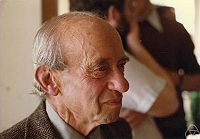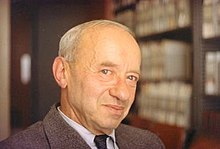Alfred Tarski

Alfred Tarski or originally Alfred Tajtelbaum or Teitelbaum (born January 14, 1901 (according to other sources: 1902 ) in Warsaw ; † October 26, 1983 in Berkeley , USA ) was a Polish-American mathematician and logician . Alfred Tarski made fundamental contributions to both formal sciences and formal truth theory ( Convention T ) and is one of the main representatives of the Lviv-Warsaw School before the Second World War .
Life
Alfred Tarski was born under the name Tajtelbaum to a wealthy Jewish family in Warsaw. He grew up in Warsaw and enrolled in 1918 as a student at the local university one. His original intention was to study biology, but under the influence of Jan Łukasiewicz , Stanisław Leśniewski and Wacław Sierpiński, he switched to mathematics. His doctoral thesis, submitted in 1923, he completed under the supervision of Leśniewski; he received his doctorate in 1926 . In 1923 he and his brother Wacław changed his family name to the Polish-sounding name "Tarski" (whose ending " -ski " suggests a descent from the historical Polish nobility). The two brothers converted to Catholicism, the dominant religion in Poland. However, the conversion was only a step on paper; in fact, Tarski was a staunch atheist. Tarski took on the name change and the change of denomination because he hoped that this would improve his chances of applying for a chair. However, this hope did not come true at first and several applications (in Lviv and Poznan) were disappointing for him. From 1926 he worked in Warsaw as a lecturer in logic and wrote several textbooks and scientific papers in the following time. In 1929 he married Maria Witkowska, with whom he had a son and a daughter. In 1930 he came into contact with the Vienna Circle and Kurt Gödel .
The onset of World War II had catastrophic effects on Polish logic. Structures between scientific institutions were destroyed and the persecution of the Jews cost the lives of several logicians, philosophers and mathematicians. Tarski, who felt more like a Pole than a Jew, was unaware of the gravity of the situation and only narrowly escaped the fate to which many of his Jewish colleagues fell victim. In August 1939 he received an invitation to the Unity of Science conference in the USA and, firmly convinced that he would only be away for two weeks, he left his wife and children in Warsaw and left Poland on the last ship before there was no legal route gave more to leave the country. The logician Janina Hosiasson-Lindenbaum (1899–1942) wanted to attend the same conference and take the next ship to North America, but was refused a visa. She and her husband Adolf Lindenbaum were murdered in the Vilnius ghetto in 1941 . Tarski's wife and children survived the war in Poland, but numerous other relatives lost their lives in the Holocaust . After the war, Tarski stayed in California, reunited with his family, and built a school of logic in Berkeley.
Scientific achievements
As early as 1930 Tarski developed a formula that almost corresponded to Kurt Gödel's sentence of incompleteness from 1931.
His work included new approaches in the treatment of decision problems, the axiomatization of algebra and geometry, and the algebraization of logic and metamathematics . His work On the Concept of Logical Conclusion (1935) established model theory ; the definition of the conclusion given there is undisputed in mathematics today and serves as the basis for the definition of mathematical logics . Philosophically, Tarski's conception of truth was particularly influential (cf. Semantic Theory of Truth ). In particular, his conception of truth influenced the American philosopher Donald Davidson .
Honors
The Tarski Lectures at the University of California, Berkeley are held in his honor and are also an important award for mathematical logicians.
In 1954 he gave a plenary lecture at the International Congress of Mathematicians (ICM) in Amsterdam ( Mathematics and Metamathematics ), in 1962 he was invited speaker at the ICM in Stockholm ( Undecidability of the elementary theory of commutative semigroups ) and in 1950 in Cambridge (Massachusetts) ( Some notions and methods on the borderline of algebra and metamathematics ).
Memberships
Tarski was elected to the American Academy of Arts and Sciences in 1948, the National Academy of Sciences in 1965, and the British Academy in 1966 .
honors and awards
- 2000 namesake for the asteroid (13672) Tarski
A variety of sentences and mathematical terms are named after him.
See also
Works
- The concept of truth in the formalized languages . In: Studia Philosophica . [Lemberg] 1 (1936), pp. 261–405 (preprint dated 1935). The article is a German translation of the Polish work first printed in 1933, but presented to the public in 1931. Reprint in Karel Berka, Lothar Kreiser (ed.): Logic texts. Annotated selection on the history of modern logic . Akademie-Verlag, Berlin 1983, pp. 445-546, in English in Tarski: Logic, Semantics and Metamathematics - papers from 1923 to 1938 by Alfred Tarski. Oxford 1956, 1983.
- About the concept of logical inference. In: Actes du Congrès international de philosophie scientifique, Sorbonne, Paris 1935. vol. VII: Logique . Hermann, Paris 1936, pp. 1–11.
- Foundation of scientific semantics. In: Actes du Congrès international de philosophie scientifique, Sorbonne, Paris 1935. vol. III: Language et pseudo-probèmes. Hermann, Paris 1936, pp. 1–8.
- The Semantic Conception of Truth and the Foundations of Semantics . In: Philosophy and Phenomenological Research. IV, 3 (1944), pp. 341-375. (German translation in: Gunnar Skirbekk (Ed.): Truth Theories. A selection from the discussions about truth in the 20th century. Frankfurt am Main 1977, pp. 140–188.)
- Introduction to mathematical logic and the methodology of mathematics . Springer, Vienna 1937.
- Introduction to Mathematical Logic . translated by Erhard Scheibe (with the author's additions in the English and French editions) 2., revised. Edition. Vandenhoeck & Ruprecht, Göttingen 1966. (= Modern mathematics in elementary representation. 5.) (5. Edition. 1977, ISBN 3-525-40540-5 . (With appendix "Truth and Proof"))
- with Andrzej Mostowski and Raphael M. Robinson : Undecidable theories . North-Holland Publ., Amsterdam 1953. (= Studies in logic and the foundations of mathematics.)
- Steven R. Givant, RN McKenzie (Ed.): Collected Papers. 4 volumes, Birkhäuser, Basel / Boston 1986, ISBN 3-7643-3284-0 .
literature
- Jürgen Alex: On the origin of the computer - From Alfred Tarski to Konrad Zuse - On the influence of elementary propositions of mathematical logic in Alfred Tarski on the development of the three computer concepts of Konrad Zuse - Tertium non datur . VDI-Verlag, Düsseldorf 2007, ISBN 978-3-18-150051-4 .
- Anita Burdman Feferman, Solomon Feferman : Alfred Tarski. Life and Logic . Cambridge University Press, Cambridge u. a. 2004, ISBN 0-521-80240-7 .
- Steven Givant: Unifying threads in Alfred Tarski's work . In: Mathematical Intelligencer . 1999, No. 1.
- Steven Givant: Bibliography of Alfred Tarski . In: The Journal of Symbolic Logic . 51/4, 1986, pp. 913-941.
Web links
- Literature by and about Alfred Tarski in the catalog of the German National Library
- Mario Gómez-Torrente: Entry in Edward N. Zalta (Ed.): Stanford Encyclopedia of Philosophy .
- Wilfrid Hodges: Tarski's Truth Definitions. In: Edward N. Zalta (Ed.): Stanford Encyclopedia of Philosophy .
- John J. O'Connor, Edmund F. Robertson : Alfred Tarski. In: MacTutor History of Mathematics archive .
Individual evidence
- ↑ According to Anita Burdman Feferman, Solomon Feferman Alfred Tarski-Life and Logic , Cambridge University Press, 2004, p. 37, both name forms can be found in the Warsaw archives (Tajtelbaum is the Polish spelling, Teitelbaum the German with the same pronunciation). His first publications were under the name Tajtelbaum. "Tajtelbaum" is Yiddish for "date tree, date palm".
- ↑ Publication: O wyrazie pierwotnym logistyki. In: Przeglad Filozoficzny 26 (1923), pp. 68-89; engl. Translated into: Logic, Semantics, Metamathematics . Papers from 1923 to 1938, Clarendon, Oxford 1956, 2. A. Hackett, Indianapolis 1983, pp. 1-23. Also in: On the primitive term of logistic. In: Jan TJ Srzednicki, Zbigniew Stachniak (ed.): Leśniewski's systems protothetic. Kluwer, Dordrect 1998, pp. 43-68.
- ↑ There, in a controversial decision, Leon Chwistek received the chair
- ↑ Book of Members 1780 – present, Chapter T. (PDF; 432 kB) In: American Academy of Arts and Sciences (amacad.org). Retrieved March 6, 2018 .
- ^ Fellows: Alfred Tarski. British Academy, accessed August 5, 2020 .
- ↑ cf. en: List of things named after Alfred Tarski
- ^ Bibliographical information reprinted in Tarski: Logic, Semantics and Metamathematics. Oxford 1956. First presented by Lukasiewicz to the Warsaw Scientific Society on March 21, 1931, then to the Vienna Academy of Science on January 21, 1932; printing was delayed.
| personal data | |
|---|---|
| SURNAME | Tarski, Alfred |
| ALTERNATIVE NAMES | Teitelbaum, Alfred (maiden name) |
| BRIEF DESCRIPTION | Polish mathematician and logician |
| DATE OF BIRTH | January 14, 1901 or January 14, 1902 |
| PLACE OF BIRTH | Warsaw |
| DATE OF DEATH | October 26, 1983 |
| Place of death | Berkeley, California |
